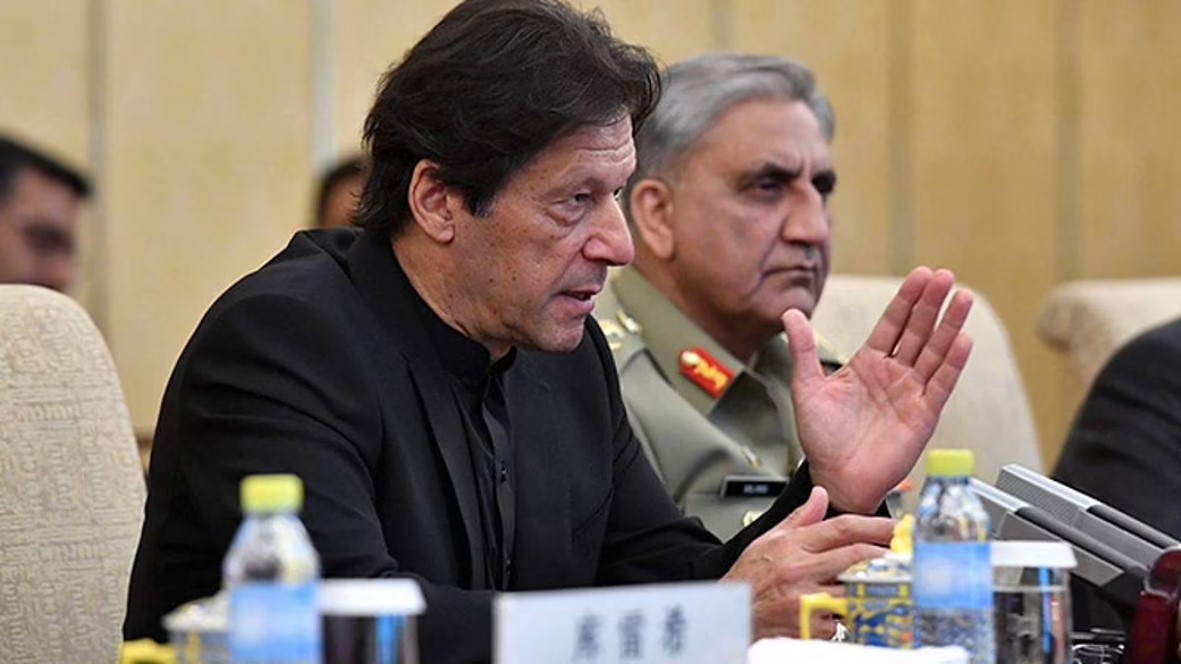This meeting not only contradicts Pakistan army chief Gen Qamar Javed Bajwa’s much touted “neutrality” claim
By orchestrating the dismissal of the no-trust motion against himself through a clumsily contrived narrative of a “foreign conspiracy,” Pakistani Prime Minister Imran Khan has lived up to his promise of giving opposition parties seeking his ouster a “surprise.” However, the cricketer turned politician, cannot be accused of keeping the opposition completely in the dark since in his April Fools’ Day interview [no pun intended] given to ARY News, he had mentioned that the “establishment” [Pakistan army] had given him three options- one, to resign, two, face the no-confidence motion, or three, call for fresh elections.
So, had those baying for Khan’s blood paid heed to his revelation, they would have got a clear hint that something unusual was in the offing. After all, didn’t Khan reveal that the all-powerful Pakistan army [which he has euphemistically referred to as “establishment”], was not only closely monitoring the political developments, but had even laid down the choices available to the beleaguered Prime Minister that were acceptable to Rawalpindi? Furthermore, by adding that “We said elections is the best option, [as] I cannot even think about resigning…” Khan did give an indication regarding the shape of things to come.
Soon after the Pakistan National Assembly [NA] Deputy Speaker Qasim Khan Suri on Sunday dismissed the no-confidence motion against Khan, the Pakistan army stated that it was the Prime Minister who had requested for a meeting and not the military. Even the options mentioned by Khan weren’t spelt out by the army, but only “mutually discussed.” Whatever be the truth, but one thing is certain- a meeting between the army top brass and the Prime Minister to discuss the emerging political scenario did take place, and Khan cunningly exercised the third option [elections] by nixing the second [no confidence motion] which is a masterstroke that renders the first option [resigning] superfluous.
This meeting not only contradicts Pakistan army chief Gen Qamar Javed Bajwa’s much touted “neutrality” claim, but also mocks his media chief’s oft repeated claim that “the army has nothing to do with politics.” Those hopeful that the judiciary will intervene to set right this brazen ‘murder’ of democracy through rejection of the no-confidence motion by the deputy speaker of the NA may be disappointed. Despite its insistence to the contrary, the Pakistan army is known to be manipulating the judiciary and there is credible evidence in this regard.
Readers may recall former Pakistan army chief Gen Pervez Musharraf admitting that despite him being on the Exit Control List [ECL], the then army chief Gen Raheel Sharif had helped him to leave Pakistan, ostensibly for medical treatment. His chilling revelation was that “These courts work under pressure behind the scenes and then give decisions. The army chief [Gen Raheel Sharif] had a role to play in releasing the pressure behind the scenes.” Though Musharraf was referring to government pressure, the fact of the matter is that the army chief can, not only influence the judiciary, but also ride roughshod over the legislature.
Then we also have the famous case of Justice Shaukat Siddiqui, a sitting judge of Islamabad High Court, admitting that “Today the judiciary and media have come in the control of ‘Bandookwala’ [literal meaning- ‘those with guns’, used here disparagingly for the army]. Judiciary is not independent” and adding, “In different cases, the ISI [spy agency of Pakistan army] forms benches of its choice to get desired results.” Since the army has been holding talks with the Prime Minister and even charting his future moves, impartiality of the judiciary while dealing with the no confidence motion case, remains suspect.
The question as to who will be the next Prime Minister is a vexed one. Many feel that while Rawalpindi may still overlook Khan’s tirade against the army, but by saying “the Indian army is not corrupt and they never interfere in civilian govt,” the PTI chief has done the unthinkable. He has berated Pakistan army by a veiled but very obvious reference to Rawalpindi’s congenital meddling in the country’s internal politics, thus crossing the red line, which many feel rules out his political ‘rehabilitation’. However, strange things happen in Pakistan-as the rejection of the no confidence motion indicates, and so, a ‘reformed’ Khan returning to power, though seemingly unlikely, won’t be a bolt from the blue.
Washington may be unhappy with Khan, but it knows there’s nothing to worry about as long as Rawalpindi is on its side, and by taking pains to reassure the US of Pakistan’s continued support, Gen Bajwa has ensured timely damage control. The good thing about Khan is that despite his sporadic outbursts, he still makes an excellent ‘marionette’, as three and half years of his prime ministership has proved, which suits Rawalpindi very well. Moreover, since he’s not averse to making ‘U’ turns, Khan can always be ‘persuaded’ by the army to tone down his anti-US rhetoric, and so his return to power, may well be the second surprise that Khan springs on his detractors.
Courtesy : Nilesh Kunwar

